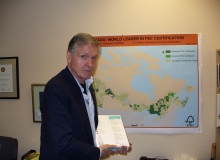

Photo by George Guidoni
Acknowledging a problem is always a key first step in its eventual resolution, and the spectacular failures of the world’s governments to develop a common action plan to address global climate change in a meaningful way—either at the Rio summit in 1992 or in Copenhagen last year—is a damning indictment of the modern consumer society’s inability to fully come grips with its grim legacy of environmental degradation and rapid depletion of natural resources.
Likewise, it is a testament to the sheer overwhelming enormity of a problem that, at the end of the day, has little chance of being redressed without concerted joint efforts on both corporate boardroom and public grassroots levels to mend the consumer society’s long-entrenched wasteful ways for the sake of laying foundation of a more sustainable planet for future generations.
As well as all the hard work of international ‘civil society movements’ like the Forest Stewardship Council (FSC) to keep everyone involved honest, focused and committed throughout the journey.
Formed in Toronto in 1993 through joint efforts of leading environmental, social and economic stakeholders to develop a common blueprint for more environmentally-sensitive logging practices and to stem the tide of rapid worldwide deforestation, the Bonn, Germany-headquartered FSC is today one of the world’s leading certification agencies, mandated with promoting the use of sustainable forestry environmental standards and practices worldwide by awarding internationally-recognized CoC (chain-of-custody) accreditations to forestry companies and their customers able to prove that their products are sourced from sustainably managed forestlands.
“As good as it is to see paper recycling continuing to grow and make big strides with businesses and the consumer public, there is only enough recycled fiber to go around to supply about a third of market demand,” says Antony Marcil, president and chief executive of Forest Stewardship Council Canada (FSCC) in Toronto, one the 46 national branches FSC operates worldwide.
BIG RESPONSIBILITY
“And since the rest of the fiber still has to come from trees, it is important that it is obtained from forests that are managed in an environmentally, economically and socially responsible manner,’ says Marcil, who joined FSCC five years ago after a prolonged career spell as a tax reform lobbyist and advocate.
“It’s somewhat of a career shift, but I find it deeply satisfying on a personal level,” Marcil told Canadian Packaging on a recent visit to the FSCC mid-town Toronto offices it shares with the Canadian branch of the World Wildlife Fund (WWF).
Founded on the underpinning premise of advancing a “civil society movement” operating independently from government regulatory and legislative framework, according to Marcil, FSCC’s environmental criteria was developed as a result of an intensive consultation process involving leading forestry companies, various environmental groups, local community organizations and native leaders looking to fill the regulatory void left behind by the failure of national governments to sign the draft global forestry treaty presented at Rio in 1992.
“Because the world’s governments failed to sign and submit the draft treaty to their respective parliaments, other stakeholders around the world decided that maybe they could do something to make up for that gap,” Marcil explains.
“So there was an intensive consultative process that ultimately led to creation of our voluntary certification system that is based on 10 core principles and 56 criteria that have remained unchanged to this day.”
Implemented locally by FSC in more than 80 countries that have FSC-certified forests, the 10 founding international principles cover established rights of tenure; indigenous rights; community relations and workers’ rights; responsible environmental stewardship; maximizing benefits from the forest; and protection of forests with high conservation value.
Although the certification system is entirely voluntary, its market-driven nature has already gained it support of many leading Canadian forestry producers and their corporate end-users, says Marcil, citing more than 1,000 FSC CoC certificates issued to date.
“From the beginning, the idea was that if we could create a common standard to protect the forests to a higher level than what was being done by existing regulations,” says Marcil, “we would be able to get the producers and users of forest products to get behind a purchasing policy, or as part of their CSR (corporate social responsibility) policy, to buy their paper products made from fiber that is certified to have been harvested from a responsibly managed forest.
“Fifteen years ago, the forestry industry’s customers may have wondered about where the fiber for their paper came from, but there was nothing to prevent their paper suppliers from just telling them what they wanted to hear,” says Marcil.
“Today, having FSC certification in place provides a guarantee mechanism for ensuring that what the company is telling them about the sustainability of their products is in fact true,” says Marcil, citing a rigorous certification process that can take up to two years, as well as comprehensive yearly audits performed by one of eight Canadian companies accredited to issue FSC certification and to allow using the FSC symbol on their products.
“It is all entirely market-driven,” says Marcil, noting that until recently it has been the major Canadian banks and insurance agencies who have been spearheading the adoption of the FSC certification in corporate Canada.
“If you go your mailbox today, you will find that all the envelopes mailed out by the big five banks and many major insurance companies will have the FSC logo printed on the back of them,” says Marcil.
Advertisement

